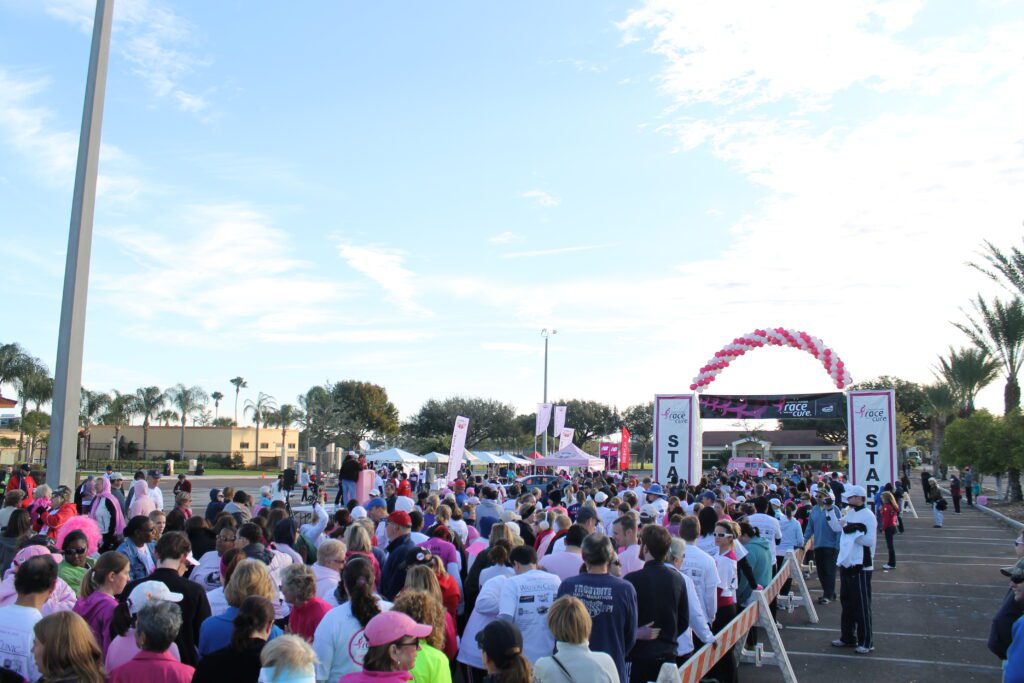Breast cancer awareness and education: a constant message
Cauney Boydston Bamberg is passionate about increasing breast cancer awareness and raising funds to help women get mammograms. She is the executive director of The Watson Clinic Foundation, Inc., and she brought the first Suncoast Polk Race for the Cure to Polk County last year.
Bamberg was asked by Dr. Elisabeth Dupont, Medical Director of Breast Health Services at Watson Clinic and a Polk County Medical Association member, to bring the race to Polk County with the goal of putting money on the table to help pay for mammograms for women who can’t afford them. Bamberg contacted Susan G. Komen for the Cure, simply referred to as Komen, to see if they would consider Polk County as a possible race site. They met at Tigertown, Lakeland, fell in love with that location—which became the site for the race—and enjoyed an amazing success last year. The Polk County Race for the Cure is now part of the Florida Suncoast region of Komen.
Bamberg made a two-year commitment. The first year’s task was to bring a first-time event to a new market, no small feat. The second year’s goal was to train her replacement, but in the middle of starting things up, she received her own diagnosis of breast cancer. Faithful about performing self-exams, Bamberg never felt a lump because her cancer was in the form of micro-calcifications that were too minute to be detected by hand. It was her annual mammogram that led to her diagnosis. She says, “The mammogram saved my life.”
It’s a dangerous misconception for women to think they’re okay if they don’t feel anything. If they don’t see any threatening signs, it becomes easy to skip a year or two. But Bamberg is emphatic that women should not put off having that annual mammogram: “It makes the difference between Stage 1 and Stage 4, between life and death.” That, in turn, makes a tremendous difference in the treatment plan. Women don’t realize the difference between having or not having the mammogram until they are faced with the disease, and the journey it may take them through mastectomy, chemotherapy, radiation treatments, and reconstructive surgery. Bamberg’s message is to “get that mammogram. Do your breast self-exams, but don’t use that as an excuse to skip a mammogram.”
And the purpose of the Race for the Cure is to bring funding to We Care of Polk County, Inc., so they can provide free and reduced-cost mammograms to women who are uninsured or who just can’t afford one, and are not eligible for any other funding resource. We Care is a network of volunteer physicians and healthcare providers that was established by the Polk County Medical Association in 1998. They coordinate specialty medical services for qualified Polk County residents who are referred by their primary physicians. We Care is the only organization in Polk County applying for grant money for preventative screenings. Bamberg says, “The more money they can raise through grants, the more mammograms they can provide.” The goal is that fewer women who fall in that category will present at the hospital with a Stage 4 tumor that was finally large enough to feel. The ramifications are much worse at that point not only for the individual and her family, but also for the hospital and future expenses. The proceeds from the race are county-wide.
According to Bamberg, Komen is very thorough about making sure money is spent the way it’s supposed to be spent. Grant recipients answer quarterly to how dollars are being used. “I find that refreshing,” says Bamberg, “as a foundation myself, to actually be accountable for the money that’s granted. That’s the way it should be on every dollar that comes in the door.” Komen Florida Suncoast, which covers a regional six-county area, was providing money to Polk County before there was a fundraiser. But, the Race for the Cure now helps raise the dollar amount.
Bamberg’s personal objective last year was to raise as much money as possible because with every dollar that comes in, they have a chance to save a life. For her, that’s what the race is all about—to elevate awareness, the importance of prevention, and educate the community that if you can’t afford a mammogram, there are resources out there, such as We Care. Last year Polk County was granted a total of $179,072.34, which was comparable to grants received by Manatee, Pasco, and Pinellas Counties.
Thanks to events such as the Komen Race for the Cure and National Breast Cancer Awareness Month, as well as information readily available on the Internet, breast cancer is much easier to talk about today than it was 15 to 20 years ago. Back then, Bamberg says, “It was a sentence; it was a leprosy-type disease.” But today it is more socially acceptable to talk about.
CREDITS
story by JANA HUSS
